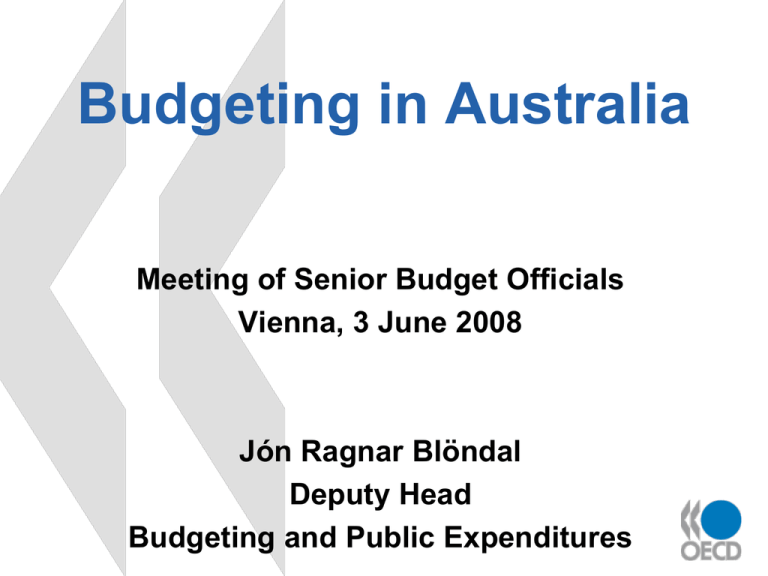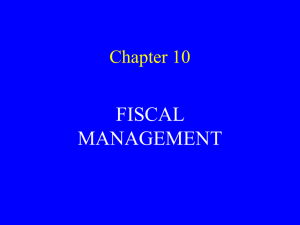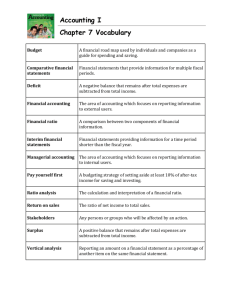History of Pioneering Budget Reform Continual change / reforms
advertisement

Budgeting in Australia Meeting of Senior Budget Officials Vienna, 3 June 2008 Jón Ragnar Blöndal Deputy Head Budgeting and Public Expenditures Agenda Australia’s economic and fiscal performance History of pioneering budget reforms Structure of government expenditures Unique organizational arrangements Principles-based fiscal rules Accrual budgeting Outcome budgeting Special funds Role of Parliament Times of Plenty Exceptional economic performance Structural reforms Commodity price boom Enviable fiscal performance Net debt eliminated Substantial tax reductions Increased expenditures Surpluses dedicated to special funds to address future fiscal challenges History of Pioneering Budget Reform Continual change / reforms since 1984 Running costs arrangements Abolishing manpower controls Carry-forwards of unused running costs appropriations Forward Estimates – baseline projections Program budgeting Program evaluation Efficiency dividend Structure of government expenditures Most public services are the primary responsibility of states and territories -Education, health, welfare and community services, public order and safety, and infrastructure Aside from defence, nearly all capital expenditure takes place by states and territories 80% of total annual expenditures are authorized in special (permanent) legislation Unique Organizational Arrangements Powerful role for Cabinet committees Fiscal guardians vs. “ad hoc” budgeting Strategic Budget Committee and Expenditure Review Committee Three separate central agencies that have strong roles in the budget process Department of Finance The Treasury Department of the Prime Minister and Cabinet Limited role of spending agencies vis-a-vis their agencies in the budget process Principles-Based Fiscal Rules Charter of Budget Honesty Comprehensive legal framework for the formulation and conduct of fiscal policy Principles of Sound Fiscal Management Stated in general terms (“prudent levels,” “reasonable degrees”) Do not mandate any specific fiscal targets Fiscal Strategy Statement Government’s interpretation of the relevant fiscal terms “Achieving budget surpluses, on average, over the medium term; keeping taxation as a share of GDP on average below the level for 2007-08; and improving the Government’s net financial worth over the medium-term” Accrual Budgeting Legal basis for appropriations is accruals All decision-making during budget formulation and deliberations in Parliament however remain on cash-basis Little differences between cash-basis and accrual-basis fiscal results Appropriating cash for non-items (depreciation) “If we knew then what we know now, we would not have implemented accrual budgeting” Accruals did improve the management of assets and liabilities Outcome Budgeting Legal basis for appropriations are outcomes Generally 1-5 outcomes per agency; most have only one Very broad, brief, aspirational definitions “Higher pay; higher productivity” “Assisting regions to manage their own futures” Role of Portfolio Budget Statements In practice, outcomes are not integrated into decisionmaking during the budget formulation stage and in daily agency operations Overwhelming focus is on programs Any discrete activity for which money is provided Special Funds Managing in a surplus environment 2006: Future Fund To finance government employees’ pension obligation 2007: Higher Education Endowment Funds Annual investment income on capital available Closed in 2008 2008: Creation of Three Funds Virtual funds Both capital and investment income available for disbursement No difference between the government simply retaining the surpluses and subsequently dedicating them to the respective policy areas rather than creating separate funds Role of Parliament Limited Role Explicit constitutional restrictions Enshrined Westminster political traditions Strong party discipline Outcome budgeting further limits Parliament’s role The Senate has a robust budget review and scrutiny function Government rarely enjoys majority in the Senate Limited analytical capacity Rely on Australian National Audit Office For further information www.oecd.org/gov/budget OECD Journal on Budgeting jon.blondal@oecd.org






